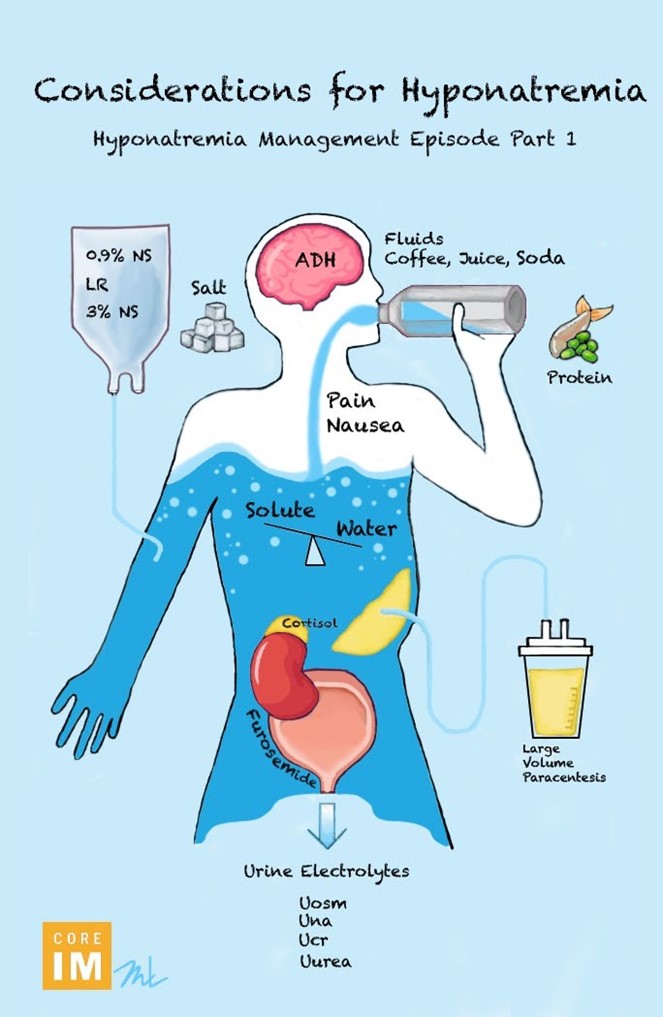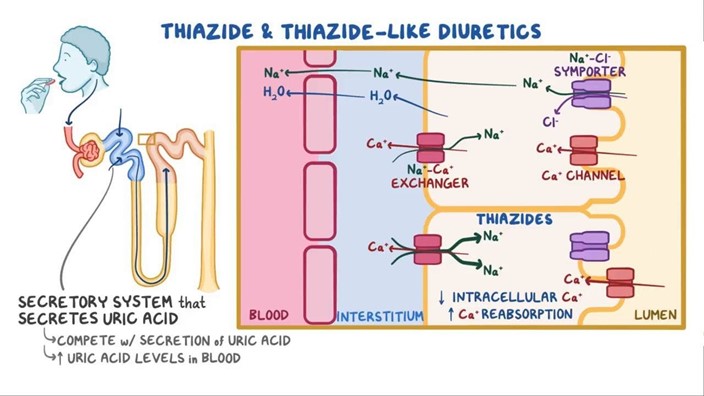An older patient comes into the clinic complaining of watery diarrhea for several days with abdominal and muscle cramping. The nurse realizes that this patient is demonstrating which imbalance?
Hyperkalemia
Hyponatremia
Fluid volume excess
Hypernatremia
The Correct Answer is B
Choice A: Hyperkalemia is not an imbalance that this patient is demonstrating, because this condition occurs when the blood potassium level is too high. This can happen in patients who have renal failure, acidosis, or excessive potassium intake. Hyperkalemia can cause muscle weakness, cardiac arrhythmias, and paralysis.
Choice B: Hyponatremia is an imbalance that this patient is demonstrating, because this condition occurs when the blood sodium level is too low. This can happen in patients who have watery diarrhea, which causes the loss of sodium and water from the body. Hyponatremia can cause abdominal and muscle cramping, nausea, confusion, and seizures.
Choice C: Fluid volume excess is not an imbalance that this patient is demonstrating, because this condition occurs when the body retains more fluid than it excretes. This can happen in patients who have heart failure, kidney failure, or excessive fluid intake. Fluid volume excess can cause edema, distended neck veins, and crackles in the lungs.
Choice D: Hypernatremia is not an imbalance that this patient is demonstrating, because this condition occurs when the blood sodium level is too high. This can happen in patients who have dehydration, diabetes insipidus, or excessive sodium intake. Hypernatremia can cause thirst, dry mucous membranes, agitation, and coma.

Nursing Test Bank
Naxlex Comprehensive Predictor Exams
Related Questions
Correct Answer is C
Explanation
Choice A: Corticosteroid is incorrect because it does not directly affect the potassium level in the blood, although it can cause sodium and water retention, which can dilute the potassium concentration. Corticosteroid is a type of anti- inflammatory medication that can be used to treat conditions such as asthma, arthritis, or allergic reactions.
Choice B: Narcotic is incorrect because it does not directly affect the potassium level in the blood, although it can cause respiratory depression, which can lead to respiratory acidosis and hyperkalemia, or high potassium level. Narcotic is a type of analgesic medication that can be used to treat moderate to severe pain.
Choice C: Thiazide diuretic is correct because it is a type of medication that increases urine output and sodium excretion, but also causes potassium loss in the urine. Thiazide diuretic can be used to treat conditions such as hypertension, edema, or heart failure.
Choice D: Muscle relaxer is incorrect because it does not directly affect the potassium level in the blood, although it can cause muscle weakness, which can mimic the symptoms of hypokalemia. Muscle relaxer is a type of medication that can be used to treat conditions such as muscle spasms, back pain, or fibromyalgia.

Correct Answer is ["A","E"]
Explanation
Choice A: Calcium-containing antacids are prescribed for patients with high serum phosphate levels, because calcium binds with phosphate and lowers its concentration in the blood. Calcium-containing antacids also help to prevent or treat hypocalcemia, which is a common complication of hyperphosphatemia.
Choice B: Increased vitamin D intake is not prescribed for patients with high serum phosphate levels, because vitamin D enhances the absorption of both calcium and phosphate from the intestines. Increased vitamin D intake can worsen hyperphosphatemia and hypocalcemia.
Choice C: Potassium phosphate is not prescribed for patients with high serum phosphate levels, because potassium phosphate is a source of phosphate that increases its concentration in the blood. Potassium phosphate can also cause hyperkalemia, which is a dangerous condition that affects the heart rhythm.
Choice D: Additional milk intake is not prescribed for patients with high serum phosphate levels, because milk is rich in both calcium and phosphate. Additional milk intake can worsen hyperphosphatemia and hypocalcemia.
Choice E: IV normal saline is prescribed for patients with high serum phosphate levels, because normal saline helps to dilute the blood and lower the concentration of phosphate. Normal saline also helps to maintain fluid and electrolyte balance in the body.
Whether you are a student looking to ace your exams or a practicing nurse seeking to enhance your expertise , our nursing education contents will empower you with the confidence and competence to make a difference in the lives of patients and become a respected leader in the healthcare field.
Visit Naxlex, invest in your future and unlock endless possibilities with our unparalleled nursing education contents today
Report Wrong Answer on the Current Question
Do you disagree with the answer? If yes, what is your expected answer? Explain.
Kindly be descriptive with the issue you are facing.
